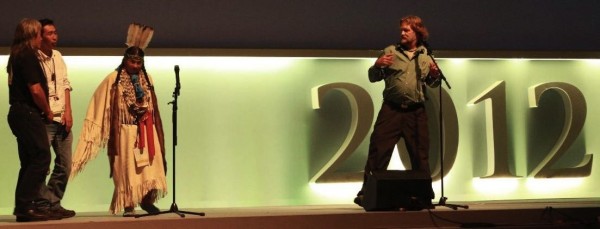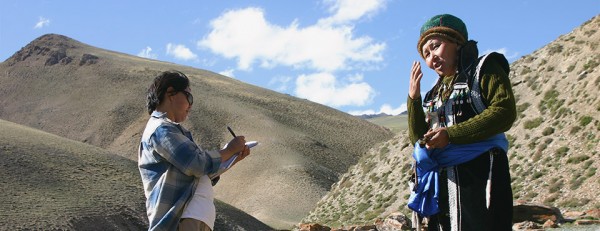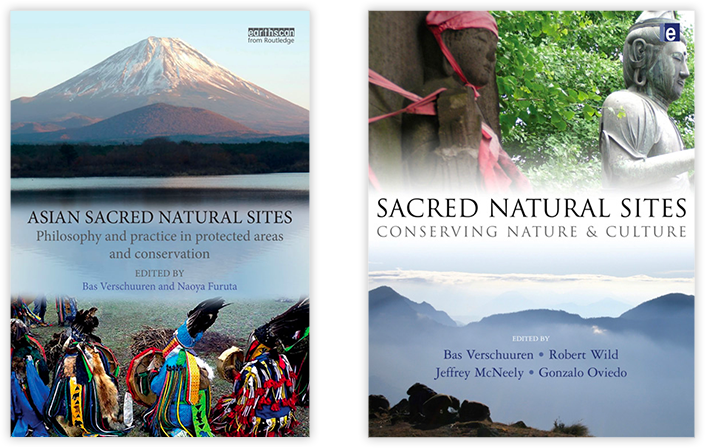
Este festival de cinema de quatro dias (outubro 5-8) com diálogos de palestrantes convidados acontece em Cinema W Cinema em Wageningen Holanda. O festival gira em torno do boom da mineração que atualmente ameaça o meio ambiente, povos e comunidades indígenas em todo o mundo. Destaca os impactos nos locais sagrados dos povos indígenas e nos seus modos de vida, vendo e cuidando do mundo que todos habitamos hoje.

Danil Mamyev e seu intérprete de Altai com o chefe Calleen Sisk da Califórnia no palco do Congresso Mundial de Conservação em Jeju, Coreia, 2012. Ao lado cineasta Christopher (Toby) Mcleod, Chefe Caleeen Sisk fala para os segmentos de filme de uma série de documentários próxima que mostra as ameaças atuais aos locais sagrados naturais do Wintu Winnemen. Foto: Baixo Verschuuren
O festival começa com três exibições de estreia para a Holanda: “Lucros e Perdas” (5 de outubro) mostrando questões de desenvolvimento de mineração em Papua Nova Guiné e nas areias betuminosas canadenses. “Ilhas do Santuário” (6 de outubro) que acompanha os indígenas australianos em sua luta contra a indústria de mineração e os nativos havaianos recuperando um campo de bombardeio desativado em suas ilhas sagradas. “Peregrinos e Turistas” (7 de outubro) mostra a resistência local a um oleoduto que está sendo construído através do Altai russo até a China e a luta dos Winnemem Wintu californianos contra a imposição de uma barragem hidrelétrica em suas terras tradicionais, inundando locais sagrados. O festival encerra com “Huicholes, os últimos Guardiões Peiote” (8 de outubro) mostrando a luta pela conservação de uma terra sagrada diante da mineração de ouro e prata no México.
Como resposta às visões de mundo conflitantes mostradas nos filmes, um debate temático com ativistas, jornalistas e estudiosos, realizando pesquisas no local, envolverá o público na discussão.
Palestrantes convidados
Mirjam Koedoot Inovador autônomo e repórter da Trouw (5 de outubro)
Elisabeth Rasch – Antropóloga e ativista do grupo da Cátedra de Sociologia do Desenvolvimento e Mudança (WUR) (6 de outubro)
Gerard Verschoor – Sociólogo sobre cosmovisões indígenas no grupo de Cátedra de Sociologia do Desenvolvimento e Mudança (WUR) (7 de outubro)
Óscar Reyna – Doutorando em ontologia política no grupo da Cátedra de Sociologia do Desenvolvimento e Mudança (WUR) (8 de outubro)
Bas Verschuuren – Coordenador do Sagrado Iniciativa Sites Natural (Facilitador)
Resumos de filmes
5 Outubro: Lucros e perdas. Christopher McLeod, 2013.
Sinopse. ‘Profit and Loss’ conta as histórias de dois grupos indígenas e a sua resistência à corrida do ouro moderna – a nossa sede insaciável por recursos minerais que ameaça as suas terras. Na Papua Nova Guiné, moradores resistem à realocação forçada por uma mina de níquel e tentam impedir seu plano de despejar resíduos de mineração no mar. No Canadá, Povos das Primeiras Nações protestam contra a destruição de áreas tradicionais de caça e pesca pela indústria de areias betuminosas, que traz empregos, mas também pode estar causando câncer. Cenas raras e verdadeiras da vida tribal permitem que os povos indígenas contem as suas próprias histórias – e nos confrontem com as consequências éticas da nossa cultura de consumo. Narrado por Graham Greene, este filme faz parte da série de documentários ‘Standing on Sacred Ground’.
6 Outubro: Ilhas do Santuário. Christopher McLeod, 2013.
Os nativos havaianos e os aborígenes australianos resistem às ameaças aos seus lugares sagrados num crescente movimento internacional para defender os direitos humanos e proteger o ambiente. No Território do Norte da Austrália, Clãs aborígenes mantêm Áreas Indígenas Protegidas e resistem aos efeitos destrutivos do boom da mineração. No Havaí, práticas ecológicas e espirituais indígenas são usadas para restaurar a ilha sagrada de Kaho`olawe após 50 anos de uso militar como campo de bombardeio.
Com Patrick Dodson (Yawuru), Emmett Aluli e Davianna McGregor (Havaí), Winona LaDuke (Anishinaabe), Oren Lyons (Onondaga), Satish Kumar e Barry Lopez.

Altai xamã Maria Amanchina assistências cultural especialista Maya Erlenbaeva com mapeamento de locais sagrados que existem fora das áreas protegidas em uma tentativa de melhorar a sua protecção. Foto cedida por Chistopher McLeod & Film Project sagrada Terra.
7 Outubro: Peregrinos e Turistas. Christopher McLeod, 2013.
Sinopse. Os xamãs indígenas resistem a grandes projetos governamentais que ameaçam o frágil equilíbrio da natureza e da cultura. Na República Russa de Altai, povos nativos tradicionais criam e patrulham seus próprios parques de montanha, tentando controlar o turismo e redirecionar um gasoduto para a China planejado pela estatal Gazprom. No norte da Califórnia, Adolescentes Winnemem Wintu moem ervas em uma pedra medicinal sagrada que seus ancestrais usaram por mil anos, enquanto os mais velhos protestam contra os EUA. o governo planeja ampliar a barragem de Shasta e submergir para sempre a pedra de toque de uma tribo. Com Winona LaDuke (Anishinaabeg), Oren Lyons (Onondaga), Barry Lopez e Satish Kumar. Narrado por Graham Greene, com histórias culturais narradas por Tantoo Cardinal.
8 Outubro: Huicholes, Os Últimos Guardiões Peiote. Hernán Vilchez, 2014.
Sinopse. O filme conta a história do místico povo Wixarika, também conhecido como Huicholes., uma das últimas culturas pré-hispânicas vivas na América Latina. Seu território ancestral sagrado conhecido como Wirikuta é o lar do famoso cacto peiote que guiou e inspirou gerações de Wixarika. Hoje, os Wixarika lutam contra o governo mexicano e as corporações multinacionais de mineração que estão invadindo suas terras natais.. As suas atividades estão a ameaçar a delicada cultura e biodiversidade desta paisagem única que é reconhecida como Património Mundial Cultural e Natural da UNESCO.. Uma luta desigual e controversa desencadeia o debate global entre valores culturais antigos, a exploração da natureza e o inevitável processo de mudança e desenvolvimento.
Para mais informações sobre os palestrantes convidados e o programa, visite www.stichtingruw.nl, www.st-otherwise.org ou Cinema W Cinema. O evento épatrocinado pelo Wageningen University Fund- Ampliando Horizontes.






